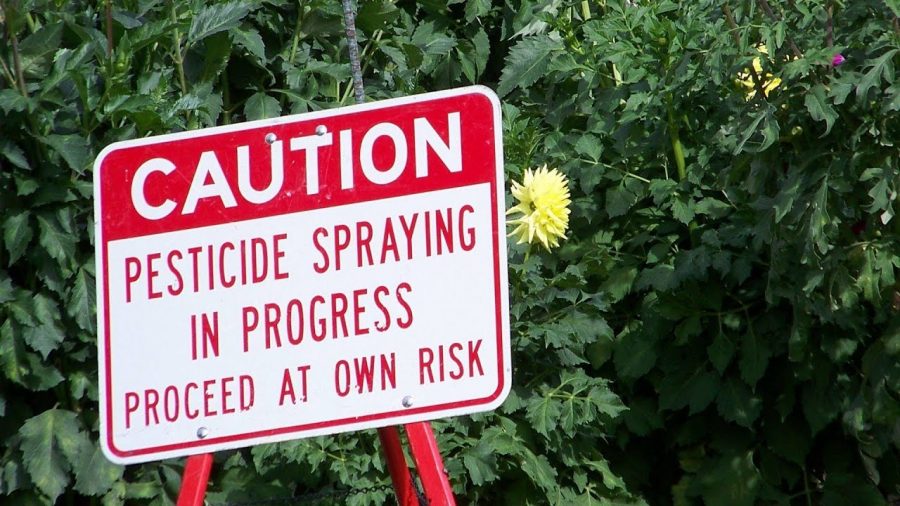Pesticides: The Unaddressed Epidemic
The usage of pesticides across California’s agricultural industry has left many farmworkers and their young children with chronic health issues.
Cancer. ADHD. Autism. All of these life-changing diagnoses are health-related consequences of exposure to pesticides in the fields that farmworkers and their families face, with these being especially prevalent in their children.
Farmworkers harvest the berries, fruits, and vegetables that made California’s agriculture worth 21.7 billion dollars in 2019. Farmworkers spend long days working in the fields, especially between May and June and August and October, the peak harvest seasons. In 2017, only 4.7% of California farms were certified organic. This means the majority of the plants that farmworkers harvest are sprayed with airborne fumigants, gaseous pesticides injected under tarps, which can drift for up to two and a half miles from where they are sprayed and spread onto farmworkers’ skin when harvesting fruit.
The effects of these pesticides show up in several ways. While neurological diseases are only passed down to children, cancer and other persistent irritations are also present. Many farmworkers complain of rashes, welts, and eye irritation when they return home from long days in the fields. Occasionally, this can result in a trip to the emergency room.
Sometimes the effects are even worse. At Achieving a Pesticide Free Pajaro Valley, a speaker event held in Watsonville, Ernestina Solorio, a farmworker and mother of four children, spoke about how pesticides and their links to learning disorders have affected her and her loved ones. She was not working in the fields while pregnant with her first two children; they are both neurologically unaffected. However, during her pregnancies carrying her two youngest sons, she had to support herself in the fields, becoming exposed to pesticides, and her two youngest both have ADHD. As a single mother farmworker, having two kids with ADHD is extremely challenging for her, with a chaotic home with limited financial resources and a son who often runs away from school.
Coming from an impoverished area in Mexico, Ernestina had no idea of the connection between pesticides and neurological disorders in children—no one had warned her of this correlation. If warned, she would have found different work—or taken greater precautions—so as to not give her children lifelong mental illnesses. She strongly believes that pregnant mothers should be made aware of the risks that lie in the fields—in other words, informed consent—and that they should not be exposed to any pesticides at all.
The science corroborates Ernestina’s story and many more farm-working mothers’ realities. In 1999 and 2000, researchers from UC Berkeley enrolled 600 pregnant women who worked in fields for the Center for the Health Assessment of Mothers and Children of Salinas (CHAMACOS) study. As their children grew up, researchers have tracked their health and development. They found that children exposed to pesticides in the womb were more likely to be hyperactive, have an autism-related condition, and were, on average, a half-year behind their peers at the age of seven.
And pesticides are not affecting just farmworkers’ children. A 2021 UCLA study found that regardless of parental occupation, living closer to pesticide application areas for certain pesticides during pregnancy resulted in elevated risks of brain cancer and central nervous system tumors in children, further displaying the disastrous effects that pesticides can have on anyone.
Speakers at the Watsonville event offered a wide range of solutions and alternatives of dangerous pesticides. Dr. John Silva echoed Ernestina’s call for information, emphasizing the need to provide families educational resources on topics like hand washing and glove-wearing in the fields as ways to prevent exposure. Others like Professor Joji Morimoto and Javier Zamora highlighted the power of switching to organic farming, both for farmworkers and farm owners.
On November 1st, Mitty students had the opportunity to listen to Dr. Ann López, a leading advocate for farmworkers and the Director of the Center for Farmworker Families. At the speaker event led by the DEI office, the Mitty Advocacy Project (MAP), and San José State University, Dr. López spoke of the effects of NAFTA (North American Free Trade Agreement: a pact between Canada, the USA, and Mexico from 1994 that eliminated tariff and nontariff barriers of trade and rendered many small farmers in Mexico unable to compete with U.S. corn), Covid-19, and pesticides on farmworkers in California. This speaker event inspired MAP’s Environmental Justice Team to spring into action to address pesticide exposure. Mitty students are currently working to write a policy proposal to reduce the exposure farmworkers face, which they hope to present to lawmakers later this year.
Farmworkers in California are the backbone of growing anything in California, but as agriculture has grown, they and their children have been left to face the long-term effects of pesticide use. A fair and just supply chain requires that we first and foremost ensure the safety of those who provide the most basic human need: food.


